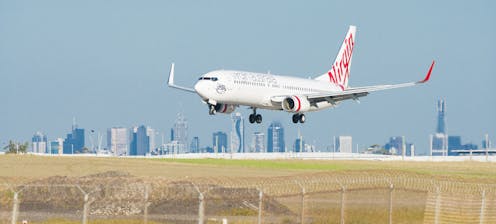Flying to a footy final? Watch your wallet. Here’s why airfares soar
- Written by Doug Drury, Professor/Head of Aviation, CQUniversity Australia

Planning a flight to an AFL final is like trying to decide when and how to hop on an amusement park ride that hasn’t stopped.
You don’t know where you need to be until the very last minute, and by then, it seems everyone else wants to be there too.
This annual dilemma is now in sharp focus, with preliminary finals coming up this weekend. Sydney will face Port Adelaide at the Sydney Cricket Ground on Friday night, then Geelong will take on Brisbane in Melbourne on Saturday.
Getting to these locations on the right dates can be no mean feat, and some fans have already been stung by surging prices. For those who tried to book over the weekend, prices to fly from Adelaide to Sydney in time for Friday’s game reportedly ranged[1] from $597 to an eye-watering $1,723.
Australia’s airline duopoly is already under intense scrutiny. According to government data[2] released this week, domestic airfares have risen by more than 10% since Rex shut down its capital city services.
So how exactly do airlines price their fares today, and then again once the teams are decided? Why are they allowed to charge so much?
How are airfares priced?
Airfares are set through a process called revenue management. Airlines use mathematical modelling[3] to help determine what we as consumers are willing to pay.
Airlines plan out their entire year based on what services they predict will be needed at certain times – such as travel for school breaks, winter skiing, or summers in Hawaii.
In economics, this is known as seasonal supply and demand. Airlines have the supply, planes, and we as consumers provide the demand.
The cost of flights to cities hosting footy finals might seem outrageous. But these games are one-off events that happen at the same time each year.
Using historical data, airlines have determined that enough people are willing to pay these fares to justify charging them.
Two types of traveller
Airlines base their pricing strategies[5] on the assumption that we as travellers fall into two groups: elastic and inelastic. Here, elasticity simply describes how sensitive demand is to a change in price.
Vacationers with a flexible calendar are an example of elastic travellers, who are able to change their flight dates to get the lowest airfare.
Inelastic travellers, on the other hand, include business travellers who need to be somewhere specific on a particular date, and aren’t paying fares out of their own pocket.
Airlines factor in both of these groups to determine demand-based pricing[6].
Footy finals create huge amounts of inelastic demand, allowing airlines to push up their prices.
Does the price actually reflect the value?
Transactional utility[8] is a theory based upon the assumption that the price we pay for a product or service should reflect the value we receive. In this case – how much fans are willing to pay to be there to watch the game live.
But individually, this depends on who you barrack for, as well as whether you have the disposable income to pay a premium for the experience. Last year, some airfares to the grand final soared above the $2,000 mark[9].
So how are the airlines able to set these prices? Are they not regulated by the government? It all comes back to what we as consumers are collectively willing to pay for a diminished supply during high demand. The government does not regulate airfares on that level.
Airlines will not want to sell discounted seats if they know enough of us are willing to pay. They might run more flights, but that doesn’t necessarily mean airfares will come down.
Our decision to buy a seat is based on the perception of its fairness. Getting into the final is costly enough – does the price charged to fly there also seem fair[10]?
Airlines know the psychology of fairness is what will fill the seat. So they will continue to test our perception of fairness on last minute purchases.
Less competition makes it worse
These types of pricing strategies are not unique to Australia. Airlines all around the globe understand the passion associated with championship sporting events and position themselves to take advantage of such moments.
But we also know that here, airlines are pricing what they can in part due to very low competition, only worsened by the recent demise of Bonza and Rex.
Read more: What just happened to Bonza? Why new budget airlines always struggle in Australia[12]
We can voice our displeasure[13] about this situation with the Australian Competition and Consumer Commission, but in the short term, many of us simply continue to pay the airfares.
This is because the other methods of travel either don’t exist, such as high speed rail, or aren’t reasonable, such as driving for multiple days.
Remember, airlines see this as an opportunity to increase their bottom line as part of their revenue management system.
So what should you do if your team makes the grand final? Sell your car or house? Take out a second mortgage?
What if you book now while it’s still relatively cheap and your team doesn’t make the final? Well, there is plenty to do in Melbourne in September!
I, for one, will be watching from the comfort of my lounge room.
References
- ^ reportedly ranged (www.adelaidenow.com.au)
- ^ data (australianaviation.com.au)
- ^ mathematical modelling (www.sciencedirect.com)
- ^ Joe Castro/AAP (photos.aap.com.au)
- ^ pricing strategies (doi.org)
- ^ demand-based pricing (digitalcommons.odu.edu)
- ^ Gustavo Fring/Pexels (www.pexels.com)
- ^ Transactional utility (digitalcommons.odu.edu)
- ^ above the $2,000 mark (www.couriermail.com.au)
- ^ seem fair (digitalcommons.odu.edu)
- ^ Joel Carrett/AAP (photos.aap.com.au)
- ^ What just happened to Bonza? Why new budget airlines always struggle in Australia (theconversation.com)
- ^ voice our displeasure (www.accc.gov.au)
Authors: Doug Drury, Professor/Head of Aviation, CQUniversity Australia
Read more https://theconversation.com/flying-to-a-footy-final-watch-your-wallet-heres-why-airfares-soar-239104







